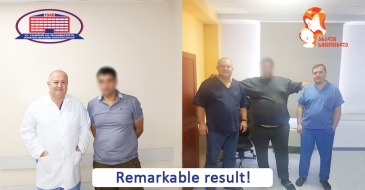Sleeve-gastrectomy is a stomach’s vertical resection, where volume of the stomach reduces.
With removed part of the stomach, hormone responsible for appetite is also removed. To be more specific, ghrelin is a hormone that causes feeling of hunger. This operation fights excess weight and ensures regression of diseases accompanying obesity.
According to World Health Organization morbid obesity is considered to be a world epidemic of non-infectious etiology. Based on a data from the same organization, there are about 2 million overweight people in a world and 10% of them are suffering from morbid obesity.
Many patients utilize sleeve-gastrectomy operation at National Center of Surgery, “New Life” clinic.
Reader often asks what does the sleeve-gastrectomy mean, in which cases is it performed, how is post-operational period and etc. Since there’s a high interest in society regarding operations like this, we’ve decided to provide readers with particular information.
National Center of Surgery, “New Life” clinic’s head of the surgery department, surgeon Jaba Babaevi discusses the topic.
Surgeon states - „Obesity is a polietiologic disease that includes genetic, endocrine, metabolic, living, psychological factors. It should be noted that fighting obesity with surgical method is necessary, when body mass index (BMI) is more than 35-40 kg/m2 and also, patient has pathologies caused by metabolic syndromes such as type II diabetes, hypertonic diseases, osteoporosis, vascular failure, reproductive dysfunctions. Following doctors are involved in patient’s preparation procedures before the operation: endocrinologist, cardiologist, gastroenterologist, psychologist, anesthesiologist and of course, bariatric and laparoscopic surgeon.”
As Mr. Babaevi stated in an interview with us, the duration of the operation is approximately 1,5-2 hours and patient is discharged from the hospital practically 3-4 days after the operation.
Endocrinologists control patient’s health condition, post-operational weight correction and nutrition regime. The final result is achieved 4-5 months after the operation.
What you should know about laparoscopic method?
Laparoscopic operation has quite a lot of benefits. First of all, it’s less traumatic and that’s why rehabilitation period proceeds faster and simply, post-operational period is significantly shorter and light. Also, there’s no need for special care, bed regime and physical activity limitations. The risk of post-operational complications is less. Due to its’ size, stitches heal easier.
All of this has a special importance for patients with chronic diseases, for example people suffering from diabetes (in diabetic people healing processes are very complicated)
With laparoscopic method abdominal cavity remains closed and that’s why the chances of post-operative infection are minimal. Wound suppuration is also very rare. In case of open interventions, especially in overweight people, this problem is very pressing matter due to the fact that hypodermic fat tissue is prone to suppuration. Even though post-operational hernia is frequent in open operations, laparoscopic operation has practically none.









